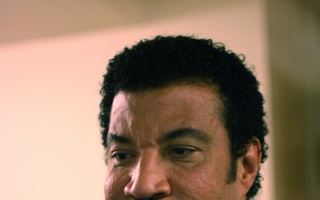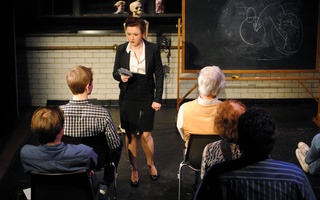These are serious themes to take on, but “Little Murders” tempers its graver concerns with a hefty helping of comedy. “It’s a really fast-paced humor,” Milikowsky says. “In art, I’ve always liked getting to serious things through laughter.”
Comedy is notoriously difficult to get right, though. “It’s hard, because we have characters in these very farcical situations, but we never want to let the characters themselves become farce,” Leimkuhler explains. “Even when the situation is funny and obviously ridiculous to us, it’s life and death for that character.”
Milikowsky’s experience in comedic staging has proven vital to helping the actors navigate this tricky theatrical territory. “Shira is very, very specific with every single beat that happens throughout the show,” Samuel B. Clark ’15 says.
For Milikowsky, this kind of exactitude is essential for a comedic production. “Comedy is timing,” she says. “There have been times that we’ve spent 45 minutes on a double take—who does the double take, in what direction, and at what tempo.” The hope is that all of this work will result in a production that is as precisely staged as a dance performance and devastatingly funny without losing any of its bite. “We want this to be the kind of performance where you laugh, and then you feel slightly uncomfortable about having laughed,” Leimkuhler says.
{shortcode-0df762b16f898e7188060b1b7445cb73564e4a3e}
PATH FINDING
Theatrical skills like the comedic accuracy described above can be learned—but not as part of a Harvard student’s primary field of study. On a list of concentrations that includes Germanic languages and literatures, folklore and mythology, environmental science and public policy, and five kinds of biology, perhaps the most surprising absence is dramatic arts. Harvard students who want to go into acting, production, directing, design, and other performance-related careers are obligated to write papers, study for midterms, and keep up with all the required work for their concentration while using their free time and elective classes to pick up the skills and experience they need.
Weeks spent rehearsing for upwards of six hours a day likely means that some work is left undone, some tests not studied for, some sacrifices made. Yet despite the challenges of the situation, there are also benefits to pursuing theater at Harvard. “This is an amazing place to be if you want to be in the arts,” Sass says. “It might not be an obvious place to be, but the most important thing is to be around people who inspire you and are passionate about what they do.”
{shortcode-3d6d5e3e28bff7d9f9ae8cc90151064276ed6271}
Assistant director of “Little Murders” Joey R. Longstreet ’16 describes the Harvard-Radcliffe Drama Club’s status as a thriving, student-run group as another asset for those interested in careers in the arts. “There’s a crazy number of shows put on each semester, so there are always chances to be involved,” he says. He also speaks highly of the few dramatic arts classes offered each semester under the aegis of a dramatic arts secondary, particularly a directing class he took during his freshman year that was taught by Diane Paulus, artistic director of the ART (Milikowsky is teaching a directing class this spring). The Visiting Director’s Project, of course, is another valuable opportunity. “It’s as close to a professional experience as you’re going to get,” Longstreet explains.
Others on the cast, including Leimkuhler and Mauriello, highlight the ART’s contribution to Harvard student theater. “The ART is the best regional theater in New England,” Mauriello says. “I’ve been interning here since sophomore year, and it’s taught me so much about acting, production, and the theater world as a whole.”
“I think that [the difficulty of focusing on theater at Harvard] can be a positive thing,” Leimkuhler says. “You can’t just sign up for the major, make your way through four years, and then graduate and realize ‘Hey, I don’t actually want to do this.’ It’s a constant process of re-affirming that decision; you have to keep going out and auditioning for things, getting involved. You have to find your own path.”
{shortcode-c032868df332c8a1b0c4e556e8b373b633ab13f3}
The process of finding that path is familiar to Milikowsky. As an undergraduate at Yale, she was originally a history major. “I loved acting and theater, but I never saw it as something I could do with my life,” she explains. “I thought I’d go to law school.” It wasn’t until her junior year, when she directed a play as a favor to a friend, that she decided her future lay in theater. “‘Just come to the auditions,’ he said. These women were coming in and reading these parts, and I started working with them, and it just felt so good. It was like acting, which I loved, but all the parts that made me uncomfortable were gone.”
“All the things I was good at—seeing the big picture, and communicating storylines, and getting other people excited—were part of directing, and it was clear pretty immediately,” Milikowsky continues. “So that changed everything.”
Read more in Arts
No Objections to 'The Judge'Recommended Articles
-
No Murders Occur in Cambridge in 2010The Cambridge Police Department reported that last year saw no murders in the city, just the fourth time in the past 50 years that no murders have occurred in Cambridge.
-
Cambridge Sees First Murder in Over a YearOne man was pronounced dead after a shooting in Cambridge on Saturday, March 12, according to a press release from the Middlesex District Attorney’s Office, representing the first murder in Cambridge in more than a year.
-
Former Police Officer Allegedly Kills Three Family Members, Then Shoots Self
-
 Lionel Richie Recruits New Talent
Lionel Richie Recruits New Talent -
Phenomenal Cast in "Wonderful Town"Perhaps one of the greatest strengths of “Wonderful Town” is the acting, which transcends the music and lines. From Bob Baker’s (Mark R. Heath ’14) love-struck grin to Leimkuhler’s hilarious bouncing subway ride, each actor’s range of emotions, not only in their faces but in their body movements, drives the story home. At the end of the show, the performers’ honest and passionate portrayals of each character remains the best part of a wonderful “Wonderful Town.”
-
 "Miss Margarida" Gets Her Way
"Miss Margarida" Gets Her Way













